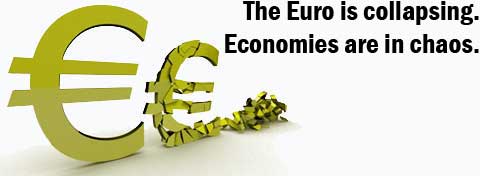Euro-Bonds
Before Eurobonds become the next great panacea for the doomed single currency it might be as well to outline what form they might take and flag up some of the more obvious pitfalls.
A bond is only a promissory note. Its value depends on who issued it. A German bond is a sovereign bond, as is a US, UK or Japanese bond. We all call things by different names for historical reasons, gilts, T bonds etc. Corporations issue bonds. Tesco, Sainsburys, Diageo most of the world's leading companies. They pay interest, usually referred to as the 'coupon'. They are often graded by the credit rating agencies, Moodys, Fitch and Standard & Poor. AAA downwards. Past problems have been caused by erroneous ratings. 'Dud' or 'junk' bonds have been rated as A. When the issuer goes down the bond becomes either worthless or partially worthless.
This was demonstrated by the crash of 2008. Interestingly the bonds were so badly rated that it was tantamount to fraud. Yet no one appears to have yet gone to prison. Credit rating agencies are now so sensitive, quite rightly, that they are taking more care on how they allocate their grades. The USA is one of the first major economic powers to suffer the indignity of a down grade. Arguably a sovereign bond issued by a country with possible $65 trillion of potential debt ($14 trillion of acknowledged debt) should be rated junk.
Portuguese, Greek and Irish bonds have already been labelled junk. Spain, Italy and Belgium can expect to be downgraded soon. In line with the market's assessment of them. The UK is no better with private funding initiatives and public sector pension liabilities which indicate UK government gilts are B at best. Incidentally if public companies showed debt in their books in the same way as sovereign states the directors would be in prison for false accounting. So far so bad. People pretty well know most of this. So where does the Euro bond come in? The concept mooted is a bond underwritten by all members of the Eurozone, from chronically broke countries like Greece to the economically strong Holland and Germany. This would stabilize speculation against weaker sovereign debt bonds for a time which is the object of the exercise. However as the peripheral countries do not really have any money the ultimate debt guarantor is German and the few other smaller but stable economies.
In order to bring a Euro bond to market their first needs to be a central fiscal authority. The European Central Bank is not the Federal Bank of America. Nor indeed the Bank of England. It is a 'virtual bank'. The ECB just turned the taxpayer into the lender of last resort. A bit like mum or dad guarantee their offspring's first mortgage. This all sounds so simple. Yet there is an enormous elephant in the room. Lack of democratic legitimacy. It turns the Eurozone into a debt union. The 'thrifty neighbour' subsidizes the 'spendthrift neighbour'. The hard worker the lazy. The efficient the inefficient. All for a political experiment that itself has no democratic legitimacy. We are simply not our neighbours' keeper. We are friendly, sympathetic and on hand for natural disasters. But not crises of our own making. The Europe of Spring 1914 was more stable than today. It is no freak accident gold is on the upward march.




